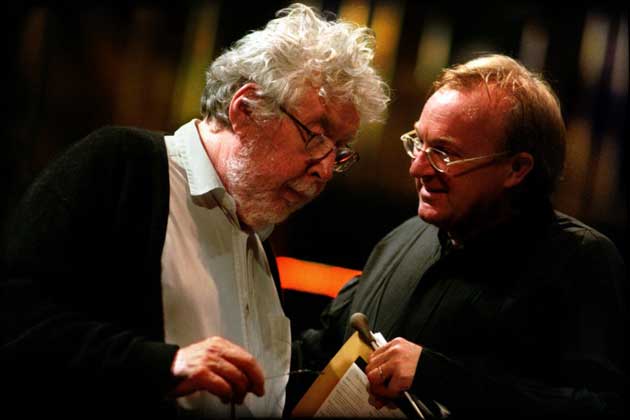Prom 39, Brabbins Royal Albert Hall, London<br/>Prom 43, Salonen Royal Albert Hall, London<br/>Prom 46, Bychkov, Royal Albert Hall, London
Decades later and we've grown to love Birtwistle's rich and strange sound world. A concert to celebrate the composer's 75th birthday is met with shock and awe – as well as affection

Even though he's reached the venerable age of 75, Sir Harrison Birtwistle's music still sounds to some listeners like a military band playing at full pelt while falling down the side of a quarry. For others, maybe a little more sophisticated, it's more like several simultaneous performances of Strauss's Elektra, but all starting at different points and each trying to outdo all the others. Yet, to judge from the reaction of the audience at the BBC Symphony Orchestra's performance (Prom 39) of the second act of The Mask of Orpheus – the Proms' major celebration of the composer's birthday – a sea-change has occurred. Audiences are not merely getting used to Birtwistle's rich and strange sound-world, but are beginning to regard it with a certain affection, mingled with the undeniable shock and awe.
Shock and awe, in the context of this vast chunk of his major opera, premiered by English National Opera in 1986 and rarely revived since, is quite understandable. Using an enormous agglomeration of woodwind, brass and percussion, plus the BBC Singers, and a dozen principals representing Orpheus,Euridice, Hecate and other denizens of the underworld, the piece charts Orpheus's dream journey through 17 arches, each of them with its own striking musical character, attaining a fierce sense of momentum as it hurtles the listener along its hour-long via dolorosa, with Barry Anderson's electronic interludes adding to the blistering sonic mix.
With the BBCSO on top form under Martyn Brabbins and Ryan Wigglesworth, startling interventions from Alan Oke and Thomas Walker, doubling as Orpheus, Christine Rice and Anna Stephany partitioning Euridice, and Claron McFadden screaming venom as Hecate, the sense of some sinister ancient ritual, endlessly renewed in Birtwistle's balefully bracing score, was thrillingly achieved. Popcorn Superhet Receiver, by Radiohead's Jonny Greenwood, might have made a bigger splash in less intimidating company, but its vigorous string writing was appealing anyway, even if it lost its way in the middle.
Like Birtwistle, Louis Andriessen's The Hague Hacking, which the Philharmonia introduced under Esa- Pekka Salonen in Prom 43, uses shock tactics, though much briefer ones, in its 18 minutes. With found material including the rhetorical opening chords of Liszt's Second Hungarian Rhapsody (which the Dutch composer encountered, he says, via a Tom & Jerry cartoon), plus a popular Dutch sing-along ballad celebrating its capital city, the piece flings some spicy Messiaenic harmonies into its demotic brew. But the result has none of the coherence Birtwistle brings to his much bigger task and less of an impression, while the two solo piano parts, written for the Labèque sisters, gave them few opportunities to shine.
Detlev Glanert's Shoreless River, given its UK launch by the BBC Symphony Orchestra under Semyon Bychkov in Prom 46, seized far more attention. The title derives from an unfinished novel trilogy by Hans Henny Jahnn which the 48-year-old German composer is currently turning into an opera. Images of water as something limitless and mysterious loom large in this atmospheric tone-poem, which caught the audience's imagination right from the start and held on to it throughout its 25-minute duration.
The Russian pianist Denis Matsuev joined Bychkov in an immaculately realised reading of Rachmaninov's Rhapsody on a Theme of Paganini that brought out the piece's alternate mordancy and romantic sweep, and sought out the genuine depth below the shimmering surface. After the interval, Shostakovich's epic Eleventh Symphony – ostensibly his tribute to the failed Russian revolution of 1905, but which some commentators now think comprises a samizdat criticism of the Soviet quashing of the Hungarian revolt of 1956 – was presented by Bychkov as a gigantic aural canvas with an almost visible action depicted in harsh, unforgiving colours. Shostakovich's music pins the listener down with its terror and despair. Its tragic import was unmistakable here, and devastating in its impact.
Anna Picard is away
Subscribe to Independent Premium to bookmark this article
Want to bookmark your favourite articles and stories to read or reference later? Start your Independent Premium subscription today.

Join our commenting forum
Join thought-provoking conversations, follow other Independent readers and see their replies